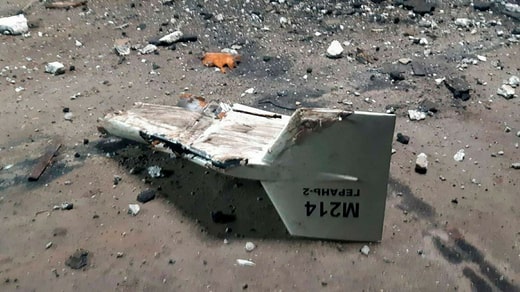While the EU last week adopted a new package of sanctions to step up the pressure on Russia - including a ban on export of drone engines and other dual-use goods and technology – the implementation of the new sanctions by the EU member states is still unclear.
As previously reported by The Brussels Times, a senior European Commission official explained that the export restrictions apply directly on Russia but not on Iran. Following requests for clarification, the Commission referred to its Q&A note on the sanctions package:
“The new export restrictions on dual-use and advanced technologies apply to the direct exports of drone engines to Russia, as well as to exports to any third country, including Iran, where there is a risk of diversion and military use in Russia.” In fact, that risk is obvious. Iran has been delivering hundreds of drones to Russia which are using them against the civilian infrastructure in Ukraine.
Furthermore, the EU’s Foreign Affairs Council wrote in its conclusions following a meeting on 12 December that “the EU notes with great concern the reports of Iranian weapons, including drones, being manufactured with components of international origin, including from Europe, and is considering the appropriate measures to take”.
However, when adopting a new round of sanctions against Iran because its delivery of drones to Russia, the Council only added four individuals and four entities to the list of those few already subject to EU’s restrictive measures.
How will the new sanctions against Iranian drones be implemented?
Asked at the Commission’s press conference on Wednesday about the new export restrictions on dual-use goods, Eric Mamer, chief spokesperson of the Commission, described them as an “authorization regime”. Peter Stano, lead spokesperson for foreign affairs, explained that the EU member states are responsible for the implementation of the sanctions.
“EU and its member states have adopted mandatory sanctions that apply in the EU,” he said. “It’s an obligation for each enterprise to respect them. It’s the member states that are in charge and competent to oversee the sanctions and implement them. If there are any violations of the sanctions, the member state concerned is supposed to act.”
“The implementation of the sanctions is the responsibility and duty of the member states,” he underlined. “If they won’t do it, the Commission will step in.”
The Commission does not possess the information about what European companies have been exporting drone engines to Iran and will apparently not request the information from the member states. A week has passed since the EU decision on new sanctions was adopted but there is no information yet whether the member states concerned have acted to stop the export of engine drones to Iran.
Are the EU sanctions against the Iranian drones effective?
Until now, the European companies have played an important role in Iran's supply chain for the production of the military drones that have been delivered to Russia, says Dr Uzi Rubin, an expert on missile defense at the Jerusalem Institute for Strategy and Security (JISS). In the past he played leading roles in Israel’s defense programs.
“The export from Europe made it easier and cheaper for Iran to manufacture those drones, saving them a lot of time and money that would have been needed to develop the engine and electronics for the drones,” he told The Brussels Times.
He does not believe in the effectiveness of the European sanctions. “The engines have already been reverse-engineered and are being manufactured in Iran. As for the electronics, stopping sales to Iran will not stop sales from other countries used by Iran as waypoints to purchase European goods. Iran will simply circumvent the European embargo.”
M. Apelblat
The Brussels Times

